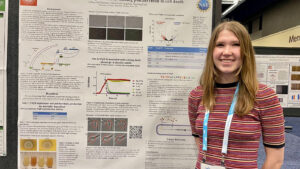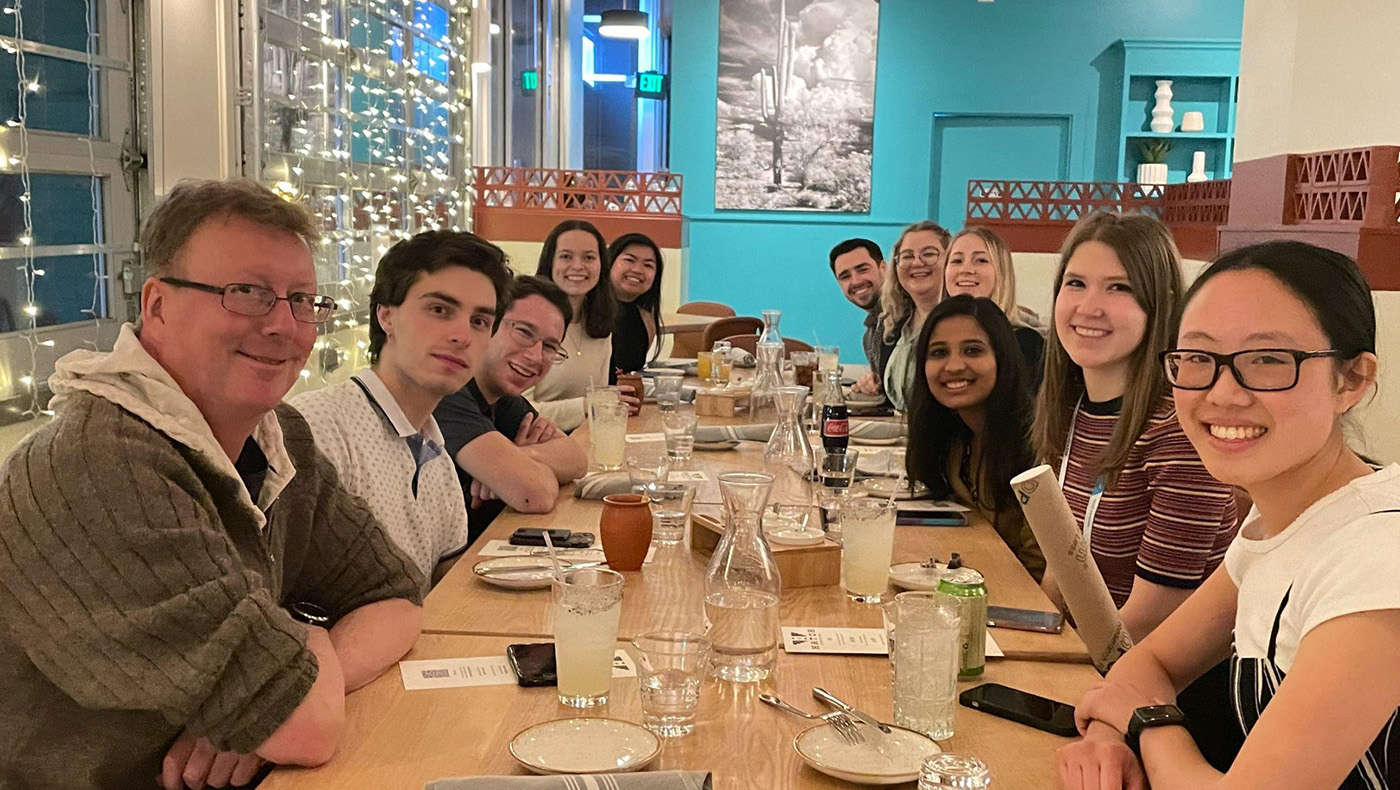Northeastern students present at research competition at the annual ASBMB Discover BMB Conference: Undergraduate Biochemistry student wins 1st place for Best Poster in Nucleic Acid and Gene Regulation category
Pipe cleaners are essential for learning biochemistry.
At least, that’s what Dr. Stevens-Truss – a professor of Chemistry and Biochemistry at Kalamazoo College in Kalamazoo, Michigan – hammered home at her lecture last month.
Dr. Stevens-Tuss is this year’s winner o the American Society for Biochemistry and Molecular Biology’s (ASBMB) Exemplary Contributions to Education award. In her class, students channel the experiential learning ethos by separating DNA strands with electricity and constructing alpha helices, 3-dimensional coils of the building blocks that our cells use to make proteins, with pipe cleaners. She says that this approach has improved her students’ understanding of difficult material and better prepared them for life after graduation.
Her talk was just one of many at this year’s edition of the ASBMB annual conference Discover Biochemistry and Molecular Biology (Discover BMB), hosted at Seattle’s Arch Convention Center from Friday March 24 to Tuesday, March 28. Lectures covered topics ranging from how to install computer programming into biochemistry curricula to the intricacies of fat digestion and provided a forum for biochemistry experts across the world to share their findings.
An aquarium-set networking reception, industry product exhibition, and one-on-one resume workshops also gave participants unique opportunities to connect with peers and prepare for the future. Featuring experts in scientific advising, the one-on-one mentoring sessions were particularly helpful for undergraduates thinking about graduate or medical school applications.
Another element of the annual conference is its signature undergraduate research competition, which encourages students to participate in research and teach the broader scientific community about their work. This year’s event was the most competitive ever, with nearly 300 undergraduates participating.
Despite the fierce competition, Gillian McClennen, a fourth-year biochemistry major, placed first in the Nucleic Acid and Gene Regulation category for her research in Northeastern’s Yunrong Chai lab. Gillian studies the YhjH protein in Bacillus subtilis bacteria, a model organism that researchers use to understand how bacteria form protective communities called biofilms. She discovered that excess YhjH can kill biofilm bacteria, making it a promising candidate for therapeutic development.

Gillian McClennen at 2023 Discover BMB Research Conference
Gillian was among seven Northeastern students to present her research on the trip, which was organized by Northeastern Biochemistry Program Director Kirsten Fertuck. With support from Northeastern PEAK awards, Discover BMB Travel Awards, and students’ labs, undergraduates Amanda Dee, Jacob Egelberg, Rupsa Jana, Devin Lloyd, Anna Meglan and Amanda Schneider also traveled to Seattle to showcase their work.
Amanda Schneider, a third-year cellular and molecular biology major, presented her Biology Project Lab research on proteins associated with Alzheimer’s disease called beta-amyloid plaques. She found that natural products that are rich in certain types of polyphenol alcohol, like cinnamon, can reduce the quantity of beta-amyloid plaques and possibly reverse plaque formation in C. elegans worms.
Rupsa, a second-year Biochemistry major, presented her research in the Northeastern Metallopeptides Interdisciplinary Research Experience (mPIRE) Lab examining the structural variance of beta-amyloid proteins and how it contributes to Alzheimer’s Disease. She determined that certain amino acids within beta-amyloid fragments help them to bind metals, enabling the plaques to cleave DNA and fats in the brain.
Meanwhile, Devin, a fourth-year biochemistry and math major, showcased his work in the Godoy-Carter lab on the Lon protease in Acinetobacter baumannii, a dangerous pathogen that often impacts post-operation hospital patients with frightening antibiotic- resistant infections. Lon helps A. baumannii form biofilms, and Devin has identified several proteins that reduce Lon production and developed a general method for discovering similar molecules.
Amanda Dee, a fourth-year bioengineering major, Jacob, a third-year biochemistry major, and Anna, a fourth-year biochemistry major, presented their experiments extracting anticancer compounds from Madagascar Periwinkle leaves, investigating how bacteria can survive antibiotics without evolving resistance, and synthesizing antimalarial compounds.
Discover BMB 2024 will be held March 23-26th in San Antonio, Texas. Students who may have research to present should contact Biochemistry Club ([email protected]) to ensure that they are informed about details and deadlines, which typically become available in September.
Photo by Kirsten Fertuck/Northeastern University

